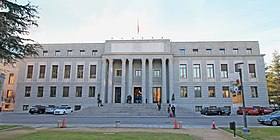Loading AI tools
National research council in Spain From Wikipedia, the free encyclopedia
The Spanish National Research Council[3] (Spanish: Consejo Superior de Investigaciones Científicas, CSIC) is the largest public institution dedicated to research in Spain and the third largest in Europe. Its main objective is to develop and promote research that will help bring about scientific and technological progress, and it is prepared to collaborate with Spanish and foreign entities in order to achieve this aim.
 | |
 Headquarters | |
| Agency overview | |
|---|---|
| Formed | November 24, 1939 |
| Preceding agency |
|
| Jurisdiction | Spain |
| Headquarters | Serrano 117. 28006 Madrid |
| Employees | 14,838 (2023)[1] |
| Annual budget | € 1.39 billion, 2022[2] |
| Agency executive |
|
| Parent department | Ministry of Science |
| Website | www |
CSIC plays an important role in scientific and technological policy, since it encompasses an area that takes in everything from basic research to the transfer of knowledge to the productive sector. Its research is driven by its centres and institutes, which are spread across all the autonomous regions. CSIC has 6% of all the staff dedicated to research and development in Spain, and they generate approximately 20% of all scientific production in the country.[4] It also manages a range of important facilities; the most complete and extensive network of specialist libraries, and also has joint research units.
Significant latest research by CSIC is the Temperature and Winds for InSight (TWINS) module, which is a component of NASA's InSight Mars lander, which landed successfully on November 26, 2018. TWINS will monitor weather at the Mars landing site.
This section needs expansion. You can help by adding to it. (December 2023) |
The CSIC was established in 1939 by one of the first governments of Francisco Franco from the assets of the Board for Advanced Studies and Scientific Research (Spanish: Junta para la Ampliación de Estudios e Investigaciones Científicas (JAE, 1907–1939)), born within the Institución Libre de Enseñanza and inspired in the Krausist philosophy. The initial mandate of the CSIC was to restore the classical and Christian unity of the sciences that was destroyed in the 18th century ("la restauración de la clásica y cristiana unidad de las ciencias destruida en el siglo XVIII").[5][6]
From its 1939 foundation to his 1966 death, its head was José María Albareda, one of the first members of the Opus Dei and a close friend of its founder, Josemaría Escrivá. José María Albareda was ordained a priest in 1959, and at his death was succeeded as head of CSIC by Manuel Lora-Tamayo, minister of Education from 1962 to 1968.
According to the statute's article 5 of CSIC State Agency,[7] the current objectives and functions of the CSIC are:
Its multidisciplinary and multisectorial nature means CSIC covers all fields of knowledge. Its activity is organised around eight scientific-technical areas:

CSIC manages the "Singular Scientific and Technological Infrastructures" (ICTS) which are facilities involving relatively high investment and maintenance costs in relation to R&D investment budgets in their field. The science community and society at large can access them, which is justified by their importance and strategic nature, and for this reason they receive each year many national as well as foreign researchers. These large facilities are recognised and supported by the European Union.
CSIC administers the following 6 Spanish ICTS facilities:
Spain participates in two large European facilities:
As of January 2018 CSIC listed 139 specialized research centers carrying out research in the above-mentioned eight different fields.[23]
Publications of CSIC include:
The Spanish National Research Council Headquarters serves as the exterior of The Royal Mint of Spain in the Spanish television series La Casa De Papel, also known by its English title Money Heist.[24][25]
Seamless Wikipedia browsing. On steroids.
Every time you click a link to Wikipedia, Wiktionary or Wikiquote in your browser's search results, it will show the modern Wikiwand interface.
Wikiwand extension is a five stars, simple, with minimum permission required to keep your browsing private, safe and transparent.